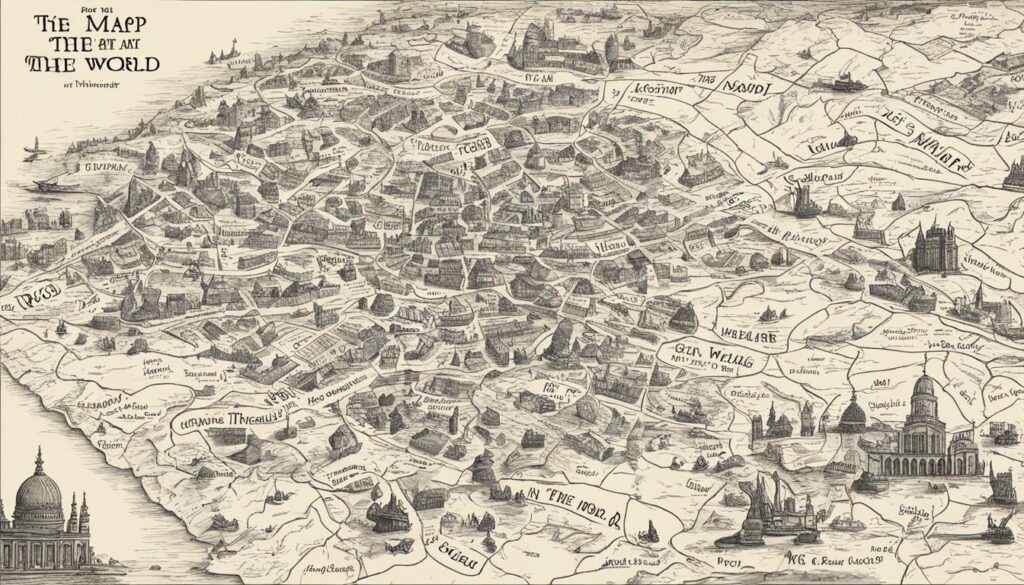If you’re looking for a fascinating and informative listen, “The Map That Changed the World” by Simon Winchester is an audiobook that should be at the top of your list. This audiobook is a must-hear for anyone interested in historical geology, cartography, or just a good story. In this review, we’ll explore the significance of Simon Winchester’s work, its storyline, the historical context, characterization, writing style, and narration, among other things. But first, let’s take a more in-depth look at the author.
Overview of the Storyline
In “The Map That Changed the World” audiobook, Simon Winchester takes listeners on a historical journey through the life and work of geologist William Smith. The storyline centers around Smith’s groundbreaking discovery of the principles of geological stratigraphy in the early 19th century, which challenged prevailing scientific beliefs and ultimately led to the creation of the first geological map of England.
As the audiobook progresses, Winchester explores the significant obstacles Smith faced due to his lack of formal education and the social attitudes of the time. He also delves into the broader scientific and societal context of the day, highlighting the intersections between politics, economics, and science in the years leading up to the Industrial Revolution.
Throughout the narrative, Winchester weaves together themes of innovation, perseverance, and systemic change, emphasizing the importance of Smith’s work in shaping modern geological and cartographic practices.
Background of the Author
Simon Winchester, born in 1944 in London, is a British author and journalist. With a degree in geology from Oxford University, Winchester began his career as a geologist in Uganda. However, he soon transitioned to journalism, where he eventually became a writer and editor for esteemed publications such as The Guardian and The Sunday Times.
Winchester is best known for his writing on travel, history, and geology. He has authored numerous books, including The Professor and the Madman, Krakatoa: The Day the World Exploded, and of course, The Map That Changed the World. His deep understanding of geology and history is evident in his writing, and he has a unique ability to make complex subjects accessible and engaging to a broad audience.
Winchester’s background in geology gives him a distinct edge when it comes to writing about historical events that revolve around geological phenomena. His expertise is apparent in his attention to detail, meticulous research, and deployment of extensive geological knowledge in his books.
Historical Context
In “The Map That Changed the World,” Simon Winchester takes us back to the early 19th century, a time of significant advancements in science, industry, and technology. At this time, geology was coming into its own as a field of study with groundbreaking discoveries concerning the earth and the processes that shape it. In England, the Industrial Revolution was in full swing, and the country was rapidly transforming into the world’s leading industrial power.
In the midst of these changes, the story follows the true-life struggles of William Smith, a self-taught geologist who was passionate about rocks and determined to unlock the secrets of the earth’s strata. But his work was met with skepticism and ridicule by the scientific community of the day, which was steeped in class hierarchies and suspicious of outsiders.
The map that Smith created revolutionized the understanding of the earth’s history and geological makeup. It became a foundation for modern geology and a testament to Smith’s intellect and vision. Winchester’s book brings to life the historical context and challenges faced by Smith, making “The Map That Changed the World” more than just a scientific treatise, but a fascinating glimpse into the way science was done in the 19th century.
Geology played a significant role in shaping the world we live in today. It was the basis for understanding the earth’s formation and its resources, as well as contributing to our knowledge of the planet’s climate and the evolution of living beings. The geological features of England, where the story unfolds, are also an essential part of the context, as it had unique strata that helped Smith create a revolutionary new understanding of the earth.
Main Characters and Their Roles
The audiobook “The Map That Changed the World” by Simon Winchester revolves around several key characters that played significant roles in shaping the events and ideas presented in the narrative. One of the primary characters is William Smith, an engineer and geologist, who spent years creating the first geological map of England. His long and difficult journey, exacerbated by societal barriers and personal difficulties, is at the core of the audiobook.
Another important character is John Farey, a mathematician and cartographer, who met Smith while working on the construction of the Somerset Coal Canal. He recognized the significance of Smith’s geological findings and documented them in a way that was accessible to a wider audience. Farey also played a significant role in promoting the validation and recognition of Smith’s work by the scientific community.
Other notable characters include Henry De la Beche, a scientist who was instrumental in the establishment of the Geological Survey of Great Britain, and Sir Joseph Banks, a naturalist and president of the Royal Society who supported the development of the geological sciences.
The roles of these characters were not only limited to the advancement of geological knowledge, but they also battled against societal biases and self-imposed limitations. Smith, in particular, was a man of humble beginnings who rose to greatness through his intelligence and determination. His struggles with debt, social status, and recognition make him a relatable and inspiring character that drives the narrative forward.
Writing Style and Narrative
Simon Winchester’s writing style and narrative technique are significant strengths of “The Map That Changed the World.” Winchester includes vivid descriptions of the landscape and environment during the time period of the story, creating a vivid and immersive experience for the listener.
His use of storytelling is especially effective in conveying complex geological concepts in an engaging and accessible manner. Instead of relying solely on technical jargon, Winchester weaves together a compelling narrative that illustrates geological principles in action.
Additionally, Winchester uses historical anecdotes and personal stories to bring the characters to life, allowing listeners to become invested not just in the geology of the story, but also in its human elements. This narrative approach adds a layer of emotional resonance that elevates “The Map That Changed the World” beyond a dry textbook explanation of geology and history.
The combination of Winchester’s descriptive writing style and engaging storytelling creates a unique and captivating listening experience that will appeal to both history enthusiasts and geology buffs.
Themes Explored
In “The Map That Changed the World,” Simon Winchester delves into several themes that have had a significant impact on geology and history.
One Man’s Determination
One of the central themes of the audiobook is the idea of one man’s determination to change the course of history. William Smith, the protagonist, is a character driven by a passion for geology and a desire to create a map that accurately depicts the underground terrain of Britain. Through his unwavering dedication, Smith is able to overcome numerous obstacles and achieve his goal, leaving a lasting legacy that has had an immense impact on modern geology.
The Power of Scientific Discovery
Another theme explored in “The Map That Changed World” is the power of scientific discovery. The audiobook demonstrates how William Smith’s revolutionary map helped to transform the scientific understanding of geology, paving the way for new discoveries and advancements in the field. Winchester highlights the importance of scientific innovation and the lasting impact it can have on society.
The Intersection of Science and Society
Finally, “The Map That Changed the World” examines the intersection of science and society. The audiobook illustrates how scientific advancements can have a profound impact on the world at large, reaching beyond the scientific community to affect everyday life. Winchester underscores the importance of recognizing the connections between science and society, and the need for continued collaboration between the two.
Historical Accuracy
One of the most significant aspects of “The Map That Changed the World” is its historical accuracy. Simon Winchester is known for his meticulous research and fact-checking processes, ensuring that his audiobooks are not only engaging but also informative and accurate.
Throughout the audiobook, Winchester draws from primary sources and historical documents to provide a detailed and accurate account of the events and characters featured. He also leverages his extensive background in geology to offer valuable insights into the historical context and geological formations discussed.
Overall, “The Map That Changed the World” is a masterclass in historical accuracy and research, showcasing Simon Winchester’s dedication to presenting an informed and well-rounded account of history.
Audiobook Narration
One of the defining characteristics of an audiobook is the quality of its narration. In “The Map That Changed the World,” the audiobook narrator brings Simon Winchester’s story to life with skill and precision, capturing the nuances of the author’s writing style and delivering an engaging performance that holds the listener’s attention from beginning to end.
The narrator’s voice is clear and expressive, conveying the emotions and personalities of the different characters throughout the audiobook. Their pacing is also well-suited to the story, providing a steady rhythm that keeps the listener engaged and interested without feeling rushed or slow.
Overall, the performance by the voice actor in “The Map That Changed the World” is exemplary, adding an extra layer of depth and meaning to Simon Winchester’s already compelling narrative.
Pacing and Structure
Simon Winchester’s “The Map That Changed the World” has a well-paced and structured audiobook that keeps listeners engaged throughout. The pacing is neither too fast nor too slow, allowing the audience to absorb the information and follow the story without feeling overwhelmed or bored.
Winchester’s use of chapter breaks adds to the overall structure of the audiobook, providing natural stopping points for listeners who may need to take a break and pick up where they left off later. Additionally, the use of foreshadowing and callbacks in the narrative helps to tie the events together and create a cohesive listening experience.
The flow of the audiobook is aided by Winchester’s smooth transitions from one event to the next. He seamlessly weaves historical context and commentary into the story, providing listeners with a deeper understanding of the events and characters. The use of descriptive language and vivid imagery also maintains the listener’s interest and helps to paint a clear picture of the events taking place.

Overall Impression
The pacing and structure of “The Map That Changed the World” by Simon Winchester contribute to an enjoyable listening experience that is both informative and engaging. Winchester’s attention to detail and skillful writing technique make for a well-crafted audiobook that is sure to delight history enthusiasts and audiobook lovers alike.
Strengths and Weaknesses
Having examined “The Map That Changed the World” by Simon Winchester, we can present an honest evaluation of its strengths and weaknesses.
Strengths:
- The audiobook provides a fascinating insight into the history of geology and cartography, making it an ideal choice for listeners interested in these subjects.
- Simon Winchester’s meticulous research and attention to detail ensure that the historical accuracy of the audiobook is commendable.
- The writing style is engaging and easy to follow, making it accessible to a broad range of listeners.
- The narrative structure is well-organized, with a clear and coherent flow of ideas.
Weaknesses:
- Listeners without a background in geology may find some sections of the audiobook challenging to understand.
- Some listeners may find the pace too slow, with the story taking time to build momentum.
- The emphasis on technical details may detract from the overall storytelling, particularly for those more interested in the personal aspects of the characters.
Overall, “The Map That Changed the World” presents a compelling story with accurate historical details and engaging writing style, though it may not be suitable for all listeners.
Audience Reception
After analyzing the themes, characters, and historical accuracy of “The Map That Changed the World,” it’s time to examine its reception among audiences. Reviews and feedback from listeners provide valuable insight into the audiobook’s quality and impact.
Overall, “The Map That Changed the World” has received positive reception from listeners, with many praising Simon Winchester’s engaging storytelling and in-depth research. On Audible, the audiobook has an average rating of 4.5 out of 5 stars, based on more than 1,500 reviews.
Listeners have commended the audiobook for its detail and insight into the historical context of geology, as well as its exploration of themes such as perseverance and scientific achievement. Some have also noted that the narration by John Curless is well-done and enhances the listening experience.
However, a few listeners have criticized the pacing of the audiobook, noting that some parts can feel slow or overly technical. Additionally, some have mentioned that the audiobook may not be suited for those with no prior interest in geology or science.
In conclusion, while “The Map That Changed the World” may not be for everyone, it has garnered positive reviews from those interested in historical nonfiction and geology. It’s worth a listen for those who appreciate engaging storytelling and in-depth research.
Comparison to Other Works
While “The Map That Changed the World” stands out as a unique and enthralling listen, there are other audiobooks that explore similar themes and subject matter.
| Audiobook Title | Author | Similarities | Differences |
|---|---|---|---|
| The Invention of Nature | Andrea Wulf | Both audiobooks explore the history and significance of scientific discoveries. | The Invention of Nature focuses on the life and work of Alexander von Humboldt, while “The Map That Changed the World” centers around the achievements of William Smith. |
| The Emperor of All Maladies | Siddhartha Mukherjee | Both audiobooks dive deep into a particular field of science. | The Emperor of All Maladies focuses on the history and treatment of cancer, while “The Map That Changed the World” examines the history of geology and cartography. |
| The Lost City of Z | David Grann | Both audiobooks combine historical research and storytelling to bring the listener into a past era. | The Lost City of Z focuses on Percy Fawcett’s search for a lost city in the Amazon rainforest, while “The Map That Changed the World” centers around William Smith’s quest to create the first geological map of England. |
While each of these audiobooks shares similarities with “The Map That Changed the World,” it is the attention to detail and the compelling storytelling that sets it apart from the rest. It is highly recommended to listeners interested in history, geology, or science in general.

Recommended for…
If you are a history enthusiast or enjoy non-fiction audiobooks that are entertaining and informative, then “The Map That Changed the World” is the perfect audiobook for you. Simon Winchester’s engaging storytelling and in-depth research create an immersive listening experience that will appeal to fans of historical narratives.
The audiobook is also recommended for geology enthusiasts, as Winchester provides a detailed account of the birth of geology as a science during the late 18th and early 19th centuries. Additionally, individuals interested in British history and the Industrial Revolution will appreciate the book’s insightful commentary on the era’s groundbreaking changes. Overall, this audiobook appeals to a broad range of listeners and delivers a thought-provoking and educational experience.
Conclusion
Overall, “The Map That Changed the World” by Simon Winchester is a captivating and informative audiobook that explores the history of geology and the impact of one man’s work on the field. Winchester’s extensive research and attention to detail are evident throughout the storyline, which is expertly narrated to provide an engrossing listening experience.
While some listeners may find the pacing of the audiobook slow at times, the in-depth analysis of historical events and characters more than makes up for any lulls in the storyline. The themes and ideas explored in “The Map That Changed the World” are both relevant and thought-provoking, making it a standout work in the genre.
The author’s writing style and narrative technique enhance the audiobook’s strengths, drawing in the listener and providing a deep understanding of the material. The narrator’s performance is also noteworthy, adding to the audiobook’s overall appeal.
While not without its weaknesses, “The Map That Changed the World” is a highly recommended audiobook for anyone interested in history, geology, or scientific advancement. Its target audience is those who enjoy a thought-provoking and well-researched audiobook that delves deep into the inner workings of a particular field.
Overall, our verdict is that “The Map That Changed the World” is an excellent choice for anyone seeking an educational and engaging listening experience, and we highly recommend it.



